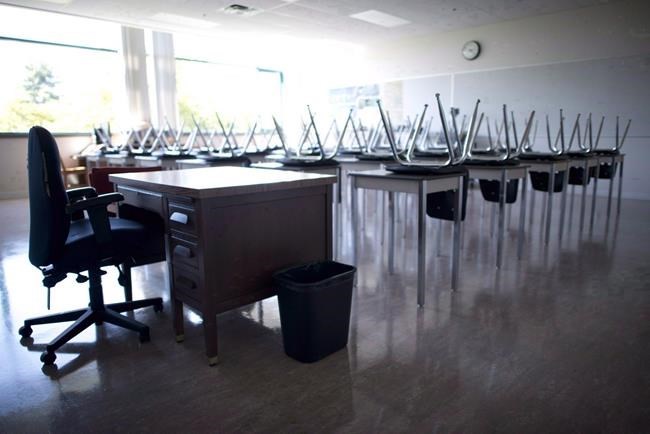OTTAWA — The debate over the safety of schools during the COVID-19 pandemic is coming under researchers' microscopes.
Three new projects are aiming determine how many teachers and school staff in Canada have had COVID-19, to help inform prevention strategies in neighbourhoods, schools and daycares.
About $2.9 million will be spent on the research in British Columbia, Ontario, and Quebec as part of the work of the national COVID-19 immunity task force.
All three projects will ask teachers for blood samples to determine how many have antibodies to SARS-CoV-2, which would indicate a previous COVID-19 infection.
In Ontario, researchers are hoping for 7,000 teachers and education workers to enrol, while in B.C. the study will focus on the Vancouver School District.
In Quebec, the work will build on an existing study looking at the spread of the novel coronavirus in children in four Montreal neighbourhoods.
The research will also delve into the question of teachers' mental health, a key area of concern for educators in recent months.
While the number of confirmed COVID-19 cases is released daily, the true number of how many people in Canada have been infected can't actually be known without widespread surveillance testing.
"Although daycare and school staff may have been exposed to SARS-CoV-2 in their work settings, we don’t have much data on how many school staff have had asymptomatic infections, meaning they had no symptoms but potentially could transmit the virus,” said Dr. Catherine Hankins, co-chair of the task force.
The CITF was set up by the federal government to understand the factors in immunity to COVID-19.
A piece of that will be the vaccines, now rolling out across the country and teachers participating in the research will also be tracked post-vaccination to see whether their antibody levels change over time.
But so far, vaccines have not been approved for use in children, which will likely leave the debate about the safety of schools raging for months to come.
This report by The Canadian Press was first published March 4, 2021.
Stephanie Levitz, The Canadian Press



